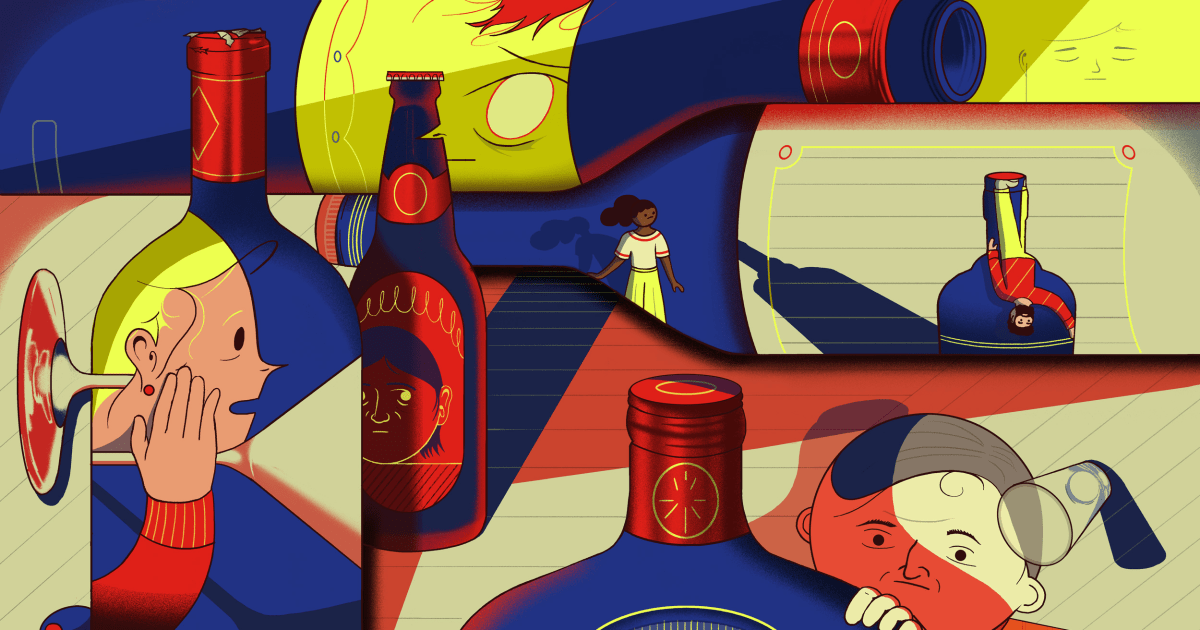
Covid crisis is exacerbating LGBTQ alcohol abuse, studies find
Alcohol consumption has increased among the general population as well, but at a significantly lower rate.
Abigail Mazzarella, 26, often went to gay bars in Baltimore before Covid-19 stay-at-home measures were introduced.
“I don't live anywhere near my family, so I did depend on that community and friendships to get by and have a type of family here,” she said.
When bars in the state closed, this physical community disappeared as Mazzarella needed its support the most. But the liquor store across her street remained open. Around the same time Covid-19 infection rates were increasing early last March, Mazzarella’s mother unexpectedly died, and exactly one week later she lost her job because of the impact of pandemic restrictions.
Abigail Mazzarella.Courtesy of Abigail Mazzarella
“I started drinking pretty much immediately after all that happened, and didn't really stop for months,” she told NBC News. “I wasn't drinking socially; I was just doing it by myself in my house and spending a ridiculous amount of money on it for no reason other than just to get drunk, go to sleep and do it again the next day. I wasn’t functioning for a good half of 2020.”
Link from the article:
SAGE Journals: Your gateway to world-class research journals
Subscription and open access journals from SAGE Publishing, the world's leading independent academic publisher.
LGBTQ Emerging Adults at Risk Due to Social Distancing
Lesbian, gay, bisexual, transgender, and queer (LGBTQ) emerging adults (ages 18–29) are already susceptible to the risks associated with social distancing. This is due to their stage of life as well as the stress related to stigma associated with their sexual orientation and/or gender identity. This developmental period is marked by identity exploration, instability, being self-focused, feeling in-between adolescence and adulthood, and having a sense of optimism for the future (Arnett, 2004). Many emerging adults find themselves going to college before starting their careers, while others move directly into the workforce. Since COVID-19 has disrupted expectations of college and career-entry hopes, many emerging adults are left having to learn how to cope with symptoms of anxiety, depression, trauma, grief, and loss during a life stage that is already met with instability.
Further, LGBTQ emerging adults are at increased risk for mental health concerns and threats to general well-being due to minority stress (Meyer, 2003). However, feeling a sense of identification with the LGBTQ community (Scroggs & Vennum, 2020) and openness about one’s identity (Kosciw et al., 2015) can serve as protective factors against this minority stress. For LGBTQ college students, this connection is frequently found through LGBTQ organizations on college campuses (Nicolazzo et al., 2017). It is common for friendship groups to be a significant source of support for emerging adults (Allan, 2008), especially for LGBTQ emerging adults (Doty et al., 2010). With social distancing mandates in place to reduce the spread of COVID-19, LGBTQ emerging adults are being asked to cope with a global pandemic while remaining physically apart from others.
Even before the pandemic, studies found that LGBTQ people, particularly women, are disproportionately likely to develop alcohol dependence and addiction, due in part to dealing with additional stressors.
Dianna Sandoval, chief clinical officer of AspenRidge Recovery, a network of rehab centers that offers LGBTQ-specific addiction treatment, explains that LGBTQ people are at a greater risk of being victims of violence and harassment, which can lead to more frequent cycles of distress and depression resulting in addictive behaviors.
Christian Cerna-Parker, CEO of the New York-based nonprofit Gay and Sober, said he has seen the age of people reaching out to his organization dropping since the pandemic hit.
“I've seen people as young as 19 come in recently. Normally, people who reach out for help are in their 40s or 50s,” he said.




